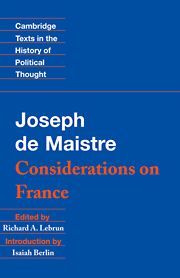Book contents
- Frontmatter
- Contents
- Note on the Introduction
- Introduction
- Chronology
- Bibliography
- Note on the text
- Considerations on France
- 1 Of Revolutions
- 2 Reflections on the Ways of Providence in the French Revolution
- 3 On the Violent Destruction of the Human Species
- 4 Can the French Republic Last?
- 5 The French Revolution Considered in its Antireligious Character
- 6 On Divine Influence in Political Constitutions
- 7 Evidence of the Incapacity of the Present French Government
- 8 Of the Old French Constitution
- 9 How Will the Counter-Revolution Happen if it Comes?
- 10 On the Supposed Dangers of a Counter-Revolution
- 11 From a History of the French Revolution by David Hume
- Postscript
- Index
- Cambridge texts in the history of political thought
1 - Of Revolutions
Published online by Cambridge University Press: 05 June 2012
- Frontmatter
- Contents
- Note on the Introduction
- Introduction
- Chronology
- Bibliography
- Note on the text
- Considerations on France
- 1 Of Revolutions
- 2 Reflections on the Ways of Providence in the French Revolution
- 3 On the Violent Destruction of the Human Species
- 4 Can the French Republic Last?
- 5 The French Revolution Considered in its Antireligious Character
- 6 On Divine Influence in Political Constitutions
- 7 Evidence of the Incapacity of the Present French Government
- 8 Of the Old French Constitution
- 9 How Will the Counter-Revolution Happen if it Comes?
- 10 On the Supposed Dangers of a Counter-Revolution
- 11 From a History of the French Revolution by David Hume
- Postscript
- Index
- Cambridge texts in the history of political thought
Summary
We are all attached to the throne of the Supreme Being by a supple chain that restrains us without enslaving us. Nothing is more admirable in the universal order of things than the action of free beings under the divine hand. Freely slaves, they act voluntarily and necessarily at the same time; they really do what they will, but without being able to disturb the general plans. Each of these beings occupies the centre of a sphere of activity whose diameter varies according to the will of the Eternal Geometer, who can extend, restrict, check, or direct the will without altering its nature.
In the works of man, everything is as wretched as their author; views are restricted, means rigid, motives inflexible, movements painful, and results monotonous. In divine works, the riches of infinity are openly displayed in the least part. Its power is exercised effortlessly; everything is supple in its hands, nothing resists it, and for it everything, even obstacles, are means; and the irregularities introduced by the operation of free agents fit into the general order.
If we imagine a watch all of whose springs vary continually in strength, weight, dimension, form, and position that nevertheless invariably keeps perfect time, we will form some idea of the action of free beings relative to the plans of the Creator.
In the political and moral world, as in the physical world, there is a usual order and there are exceptions to this order.
- Type
- Chapter
- Information
- Maistre: Considerations on France , pp. 3 - 8Publisher: Cambridge University PressPrint publication year: 1994



